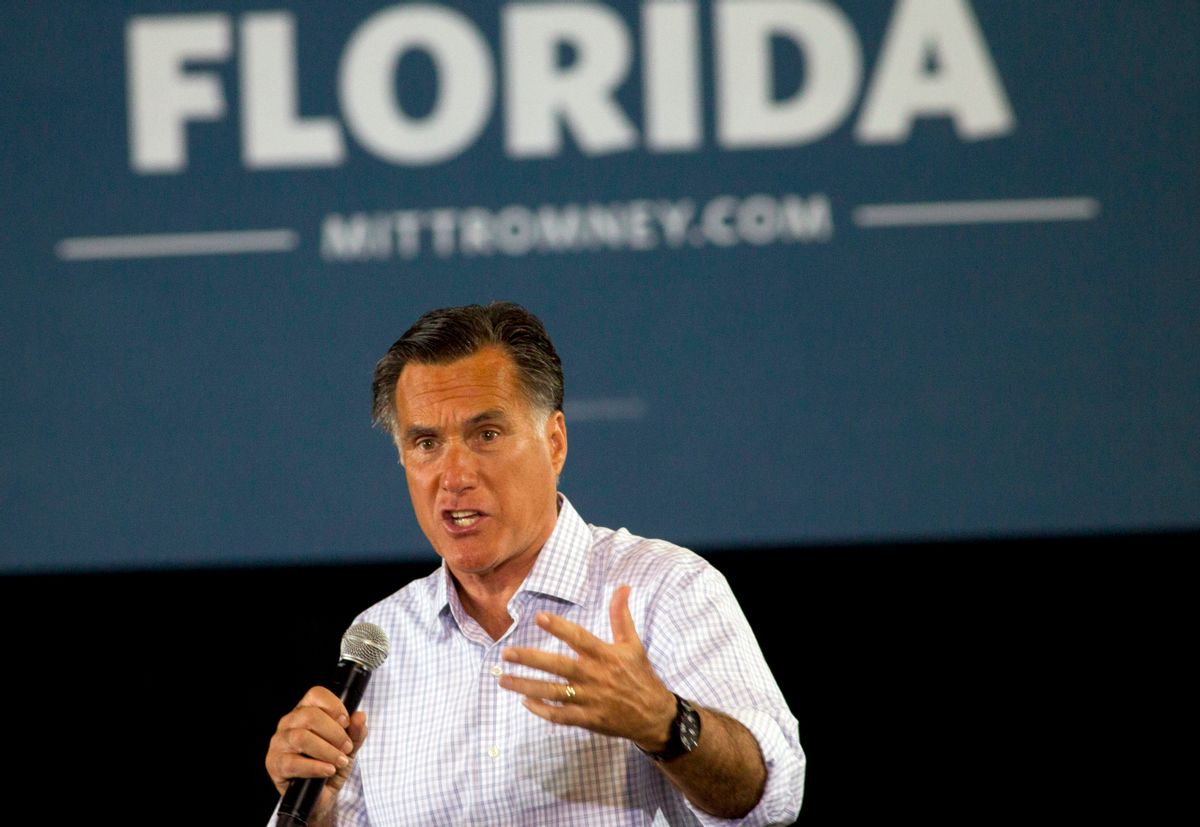Mitt Romney has a few paths to victory, some more likely than others. He could repeat George W. Bush’s performance in 2004 and carry the White House with wins in Florida, Virginia, North Carolina, and Ohio. He could cede Virginia to Obama and take Colorado and New Hampshire. He could give up Colorado and New Hampshire but win Wisconsin and the single electoral vote in Omaha, Nebraska. He could lose Ohio and make up for it with Virginia, Colorado, and Wisconsin.
But what Romney can’t do—under any remotely plausible scenario—is win the White House without Florida. Take Florida away from Romney, and he doesn’t have a path to 270 electoral votes that doesn’t involve winning a traditional blue state. Mitt Romney could run the table, win New Hampshire, Virginia, North Carolina, Ohio, Wisconsin, Iowa, and Colorado, and still fall short of 270 electoral votes. To win, he’d have to overcome a year-long, seven-point deficit in Nevada, which—on top of everything else—is not something I’d bet money on.
For most of the year, Florida has been a toss-up, with both candidates claiming short-lived leads. Since the conventions, however, the state has begun to slip out of reach for the former Massachusetts governor. In the 15 polls taken before the conventions, Romney led in six:
Florida Polls, 05/31 to 08/20
| Pollster | Date | LV/RV | Obama | Romney | Margin |
|---|---|---|---|---|---|
| PPP | 5/31–6/3 | RV | 50 | 46 | O+4 |
| Purple Strategies | 5/31–6/5 | LV | 45 | 49 | R+4 |
| Quinnipiac | 6/12–6/18 | RV | 46 | 42 | O+4 |
| Quinnipiac | 6/19–6/25 | RV | 45 | 41 | O+4 |
| We Ask America | 7/1–7/2 | LV | 46 | 45 | O+1 |
| Rasmussen | 7/9–7/9 | LV | 45 | 46 | R+1 |
| Mason-Dixon | 7/9–7/11 | LV | 46 | 45 | O+1 |
| Purple Strategies | 7/9–7/13 | LV | 45 | 48 | R+3 |
| SurveyUSA | 7/17–7/19 | LV | 48 | 43 | O+5 |
| PPP | 7/26–7/29 | LV | 48 | 47 | O+1 |
| CBS/NYT/Quinnipiac | 7/24–7/30 | LV | 51 | 45 | O+6 |
| Purple Strategies | 8/13–8/14 | LV | 47 | 48 | R+1 |
| Rasmussen | 8/15–8/15 | LV | 43 | 45 | R+2 |
| CBS/NYT/Quinnipiac | 8/15–8/21 | LV | 49 | 46 | O+3 |
| Gravis Marketing | 8/20–8/20 | LV | 46 | 50 | R+4 |
The post-convention period has been far less kind to the Republican nominee; of the 11 polls taken since the end of the DNC, Romney has led only in 3. And in the last two weeks, Obama’s lead has expanded—he leads in eight of the ten most recent polls, and his average advantage—according to Real Clear Politics—is 2.5 points. Here’s what the recent spread looks like:
The PPP survey offers two explanations for Romney’s poor standing in Florida. First, his unfavorables continue to hover near the double-digits; 44 percent of Floridians have a favorable view of the Republican presidential nominee, compared with 51 percent who hold an unfavorable view. This holds true across every age group but seniors, where the numbers are reversed—52 percent of seniors view him favorably; 44 percent don’t. If anything, this is a sign that Romney has successfully kept Paul Ryan’s Medicare plans from tanking his candidacy in the state.
The other thing that explains Romney’s poor performance are his “47 percent” comments. Eighty-nine percent of Floridians are familiar with the remarks, 50 percent say they are inappropriate, and 35 percent say this makes them less likely to vote for Romney, including 34 percent of whites. Odds are good that this is feeding into Romney’s low favorability and holding him down statewide.
The latest Washington Post poll tells a different story with regard to Romney’s favorables—50 percent have a favorable view of him—but a similar one when it comes to his standing on every issue of concern to voters. Among likely voters, Obama leads 51–47. What’s more, the gap between registered voters and likely voters has narrowed considerably—87 percent of registered voters in Florida say they are likely to vote in the election.
Obama leads Romney on who would better handle the economy (49–45), who would better determine the future of Medicare (53–38), who would better handle the deficit (49–45), who would better advance the issues of the middle class (60–35), and who would better handle taxes (48–47). Fifty-three percent of Florida voters say that Obama better understands the economy, compared with 39 percent for Romney, and 52 percent say that if Obama is re-elected, they are confident the economy will improve.
These are awful numbers for a challenger whose chief selling point is his competence on the economy. After weeks of missteps, mixed messages, and gaffes, Romney has lost his once-strong advantage on the economy in the state that is most critical to his chances in November.
We’re at a point in the election where I honestly doubt that Romney can recover from the damage of the last month. If he does, the most he can do is make Florida a toss-up again. If he can’t do that—if Obama maintains his lead through October—then election night will be a little anti-climatic. A Florida win for Obama is the closest thing to an automatic game over for Romney that I can imagine.

Shares